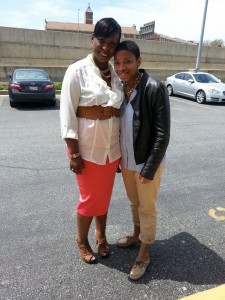
Tyra Smith struggled. Born to a single mother who did the best she could, Tyra found that growing up in the Berry Farms neighborhood in Washington, D.C. did more harm than good. Despite the extracurricular activities that her mother tried to force her into, often located far from her home, Smith didn’t want to change, a reflection mirrored in many of her life’s milestones. At one point, her mother even sent her off to live with an aunt in Montgomery County, which boasted a better education system and safer neighborhoods, believing that a change of environment would result in a change of behavior.
Graduating at the age of 20, after being held back three times throughout middle and high school, Smith now thanks her mother for “getting her out the hood.”
“I did graduate eventually,” says Smith, with a slight smirk. “I wasn’t pregnant and I have never really been jail, besides being caught for skipping school. I’ve seen girls that I grew up with, I could have been so much worse.”
Her brother, Duane, met a different fate. A high school drop-out, he stays with different family members, jumping around because no one wants to be responsible for a 22-year-old scammer, who always brings his trouble home.
Duane’s plight, one of a black man struggling to enter society, is a familiar one. Tyra’s story, a young black woman’s struggle, gets far less attention.
This year, President Obama introduced the My Brother’s Keeper Initiative, which focuses on helping every boy and young man of color access the path to success. But it leaves women out, some argue. This was the focus of a luncheon last month held in association with the National Newspaper Publishers Association’s recognition of women and women’s issues.
Despite, not addressing woman, My Brother’s Keeper has a lot going for it. According to the White House, it starts by using proven tools such as ensuring access to basic health, nutrition and high-quality education. The initiative, which is being funded by several foundations and business, including Bloomberg Philanthropies, The California Endowment and the Ford Foundation, also aims to work with communities and police to reduce violence and make streets and classrooms safer.
The end game is helping these young men stay in school and find good jobs, so that they can contribute to society instead of winding up in jail—or worse.
According to the U.S. Department of Education, by the time they enter the fourth grade, 86 percent of African American boys and 82 percent of Hispanic and Native American boys are reading below proficiency levels, compared to 58 percent of white fourth graders. According to the White House, African American and Hispanic young men are six times more likely to be victims of murder than their white peers. My Brother’s Keeper is an effort to change those numbers.
“My Brother’s Keeper Initiative is both interesting and underwhelming,” said Julianne Malveaux, an African-American political commentator and syndicated columnist for the National Newspaper Publishers Association. “Let’s not forget African American women. When African-American men cannot work, African American women take on what I call ‘the third burden’—the burden of race, the burden of gender and the burden of the picking up the slack.”
The Black Youth 100 (BYP 100), a youth activist organization for African-Americans, recently held “Who Will Keep My Sister? A Dialogue and Discussion on the Criminalization of Black Women and Girls.” The consensus: programs such as My Brother’s Keeper leave black women out. The needs of that half the race fall to the wayside, as the common belief is that black men need more.
“We’re not only our brother’s keepers, we’re our mother’s keeper’s, we’re our daddy’s keeper’s and we are our children’s keepers,” says E. Faye Williams, chairwoman of the National Congress of Black Women.
But Malveaux asks, “Who speaks for these women? Who speaks for our sisters?” She says, “Black men explode, but black women implode. We see that in the obesity, we see that in the teen pregnancy, we see that in the acting out behavior.”
In fact, women are also “exploding” more today, externalizing behavior that gets them in trouble. According to the report “Incarcerated Women” by the Sentencing Project, the lifetime likelihood of imprisonment for women is 1 in 56. African-American women have a 1 in 19 chance of becoming incarcerated as opposed to a 1 in 118 rate for white women.
The problems of the black community can’t be solved in by focusing on one gender, Malveaux insists. “Our brother’s keeper really needs to be about our people’s keeper,” she says. “Who is going to take care of black people?”






